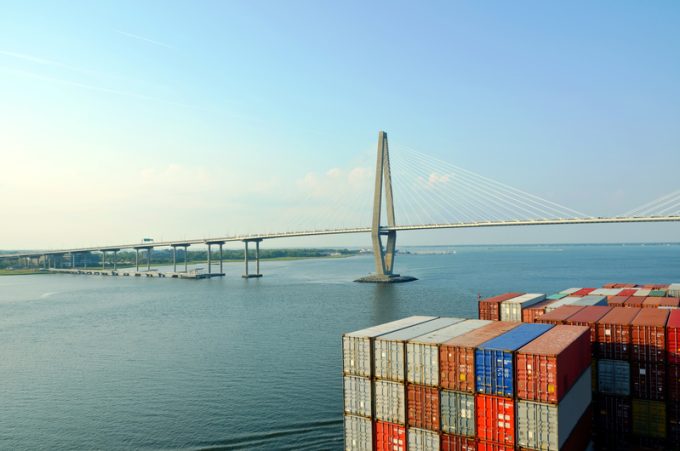US and Mexico intermodal traffic surge too much for railways to swallow?
Amid surging intermodal volumes, it did not take long for a newly minted rail connection ...
BA: WIND OF CHANGEMAERSK: BULLISH CALLXPO: HEDGE FUNDS ENGINEF: CHOPPING BOARDWTC: NEW RECORDZIM: BALANCE SHEET IN CHECKZIM: SURGING TGT: INVENTORY WATCHTGT: BIG EARNINGS MISSWMT: GENERAL MERCHANDISEWMT: AUTOMATIONWMT: MARGINS AND INVENTORYWMT: ECOMM LOSSESWMT: ECOMM BOOMWMT: RESILIENCEWMT: INVENTORY WATCH
BA: WIND OF CHANGEMAERSK: BULLISH CALLXPO: HEDGE FUNDS ENGINEF: CHOPPING BOARDWTC: NEW RECORDZIM: BALANCE SHEET IN CHECKZIM: SURGING TGT: INVENTORY WATCHTGT: BIG EARNINGS MISSWMT: GENERAL MERCHANDISEWMT: AUTOMATIONWMT: MARGINS AND INVENTORYWMT: ECOMM LOSSESWMT: ECOMM BOOMWMT: RESILIENCEWMT: INVENTORY WATCH

President Biden has earmarked $3bn for port modernisation projects across 27 US states, benefiting some 55 sites.
The White House announcement specified that the upgrades would include electrification and battery-hybridisation of port equipment, in an initiative being called the Environmental Protection Agency Clean Ports grants.
“I’m proud to announce we’re delivering $3bn in funding from my Inflation Reduction Act to help clean up and modernise ports in 27 different states and territories, from Pennsylvania, Georgia, Michigan and beyond, including, yes, Puerto Rico,” said the president.
His last remark was a jab at the Trump campaign, which at the weekend, had hired a comedian for a Madison Square Garden rally, who told the audience that the US territory was a “floating island of garbage”.
An itemised breakdown of new equipment for ports included 1,500 units of cargo handling equipment, 1,000 drayage trucks, 10 locomotives, 20 vessels, shore power systems for ocean-going vessels, battery-electric and hydrogen vehicle charging and fuelling infrastructure and solar power generation.
The news comes in the wake of allegations of spying by China’s ZPMC, manufacturer of some of the world’s largest ship-to-shore (STS) cranes, many installed in US ports.
The White House announcement indicates that the investment will “support an estimated 40,000 good-paying union jobs, manufacturing electrified cargo handling equipment”.
It further specified that the new equipment would be “human-operated and human-maintained”, setting it at odds with the definition of port ‘modernisation’ as expressed in Europe and the Middle East – namely, automating processes and cutting as many jobs as possible.
Besides pay, the main motivation behind the recent International Longshoremen’s Association (ILA) strike at east coast ports was the threat of automation. The union has demanding a ban on the automation of gates, cranes and container-moving trucks – technology already well-established throughout Europe and Asia.
“We do not believe that robotics should take over a human being’s job… especially a human being that’s historically performed that job,” said ILA chief Harold Daggett last month.
Comment on this article